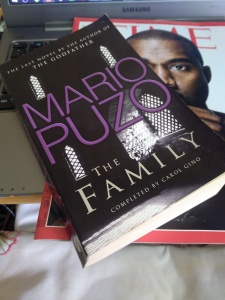Let me begin by saying that I am a die-hard Mario Puzo fan. Unlike a lot of people, I was introduced to his writing through The Dark Arena and The Fortunate Pilgrim. However, nothing could have prepared me for the sheer brilliance of The Godfather, a book so insanely popular it created an entire subgenre in American literature. Culturally speaking, it was one of the most influential film series until a young English boy arrived at the Hogwarts School of Witchcraft and Wizardry. Nevertheless, here I will be talking about Puzo’s last book, The Family, which was completed after his death (July 2, 1999) by his longtime companion, novelist Carol Gino. It is the part adventure saga, past historical romance that Puzo reportedly spent the last 15 years of his life researching. Unfortunately, while the research is excellent, the novel is not.
The story centres on one of history’s most fascinating families, the Borgias. It begins in 1492 as Rodrigo Borgia, utilizing the bribery and political intrigue that were to subsequently mark his reign, becomes Pope Alexander VI. Quickly, Alexander moves to consolidate his family’s power, and thereby its future, by placing his four illegitimate children in positions of authority and privilege. The children, Cesare, Juan, Lucrezia, and Jofre, are simultaneously spoiled and corrupted by their father, who is portrayed as a forerunner of the Mafia dons Puzo had previously written about.
Yet neither the Pope nor his children ever realize their full potential as rich historical characters. Although all of them played prominent roles in Italy’s history, none of them rose above cardboard stature in the novel. Their lives, which were dominated by murder, intrigue, war, rape and even incest, are presented in The Family with soap-opera dialogue in scenes that become increasingly repetitious. At no time do the characters come alive; at no point do they take over the novel. In an effort to portray the historical richness of the Renaissance, the book is stuffed with unnecessary details. Time after time, scenes are presented that add nothing to the central characters or the story itself other than to accommodate the appearance of such historical figures as Michelangelo, Machiavelli, da Vinci and the fanatical Florentine monk Savonarola. Regrettably, the novel fails at even this level.
The Family does not read like a Mario Puzo novel, even a lesser one. A work of such historical depth requires strong, interesting dialogue and even stronger characters to deliver it–the very qualities that always raised Puzo’s work to a higher plane. Neither exists here.
So we are left with two questions. How much of this novel did Mario Puzo actually write? How badly did his talent atrophy during the years of illness that preceded his death? In a touching afterword, Carol Gino writes lovingly of her long relationship with Puzo. She also informs us of his longstanding fascination with the Borgias and the years of research he devoted to what he hoped would be his finest novel. On the final page of the book, Gino tells how she came to complete it.
Two weeks before he died, though his heart was failing, Mario was completely lucid. And one day, as I was sitting in his study across from his desk, he reached down and pulled a bunch of pages, handwritten in red felt marker on yellow lined paper, from the bottom drawer of his desk. I thought it was something from Omerta, but it wasn’t. “Read it,” he said, and handed it to me.
And as I read I began to cry. It was the last chapter of the Borgia book.
“Finish it,” he said. “Promise me.”
And so I did.
I feel like a complete bitch saying that Mario Puzo would have been better served had Gino returned those pages to the desk drawer. But yeah.

This is really sad. I hoped on reading all of Mario Puzo’s work after having went through The Godfather. That novel was brilliant, by the way. Omerta was my first novel by him and I got to say it wasn’t as amazing as I’d hoped it be. It definitely didn’t show me a glimpse of what The Godfather was going to be. It’s a fun read, but no where mind-blowing. I just recently posted a review of The Godfather. It would mean the world to us if you could check out the review on our blog at bookidote.wordpress.com ! It would be pretty cool if you’d follow us as we put up more reviews in the future ! We’re sure to do the same with you. Nice review, man ! Pretty well-written, keep it up !
-Lashaan
LikeLike
What a total waste of my time and energy to have read this book?
It’s a pathetic book and some one who reads it with a presumption to have a similar story as in other Mario Puzo’s books such as “Godfather” or “Last Don” would be thoroughly disappointed.
Since I had begun to read this novel, I had decided to finish this at any cost. Believe me, I finished it with great difficulty and had got head ache as well.
I am so surprised how an author of “Godfather’s caliber would come up with this book in the first place?
As someone has pointed out, none of the characters catch readers attention. However, as I have pointed out, it definitely gives its readers a good migrane.
LikeLike